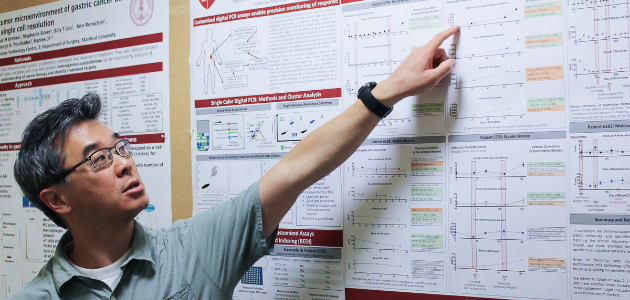Gastric Cancer Registry Completes Major Data Expansion
In 2021, the Gastric Cancer Foundation granted $257,856 to fund an expansion of the Gastric Cancer Registry (GCR) at Stanford University, which helped fuel several milestones. The registry’s researchers have since completed the genomic sequencing of 175 gastric tumor samples, providing a wealth of data to users of the GCR Genome Explorer, a HIPAA-compliant online portal scientists can use to review the molecular features of stomach tumors.
“We’re now able to provide information about gastric cancer that isn’t available from any other source,” says principal investigator Hanlee Ji, MD, Professor of Medicine at Stanford.
Most of the gastric tumor samples that Ji’s team were able to sequence over the past year came from the Intermountain Healthcare Biorepository, which provided the GCR with samples from 154 gastric cancer patients. Additional samples came from patients who enrolled in the GCR between 2011 and 2021 and provided tumor samples.
The researchers are taking a “multi-omics” approach by sequencing the whole genome, whole exome, and transcriptome from each sample. Using bioinformatics, the research team sifts through raw sequencing data to extract highly valuable and informative characteristics of gastric tumors. These features are available to the biomedical research community through the GCR Genome Explorer.
Ji says scientists can use the Genome Explorer to scrutinize the data in many ways. For example, they can study molecular and cellular features of the gastric tumor microenvironment, which could inform research into novel immunotherapy strategies. Scientists can view the microbiome of gastric tumors, demographics of each patient, and more.
In September, the GCR team published its first study describing the registry and Genome Explorer. Stanford lab manager Alison Almeda was the lead author of the paper, which appeared in Cancer Epidemiology, Biomarkers & Prevention. The paper described the data gathered from the first 41 stomach tumors that were sequenced and introduced the Genome Explorer as a key open resource for gastric cancer researchers.
The registry team is planning future publications and has been active on social media, which is helping to attract scientists to the Genome Explorer, Almeda says. There have been 55 users of the portal so far, 39 of whom are academic scientists, and the rest of whom come from biopharmaceutical companies, hospitals and other institutions.
Registry enrollment is also expanding, with 602 gastric cancer patients and family members now participating. The registry team is currently working to diversify the registry by increasing the number of tumor samples from Latinos and other ethnic groups that face a high risk of gastric cancer, Ji says. The GCR researchers are also investigating the use of new molecular analysis tools that could help them derive even more information from the samples.
“I remember when we first met with Gastric Cancer Foundation to discuss the project, and I’m happy to say we’re doing everything we said we wanted to do back then,” Ji says. “We are so grateful to the foundation for the support.”
To learn more about the Gastric Cancer Registry, click here.

